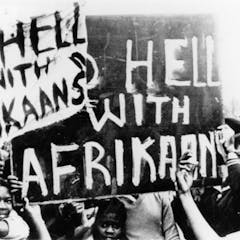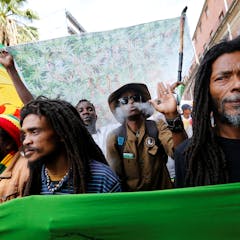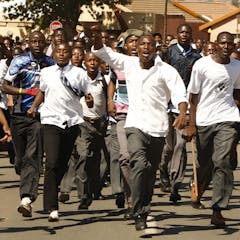
Articles on South African politics
Displaying 221 - 240 of 328 articles

That South Africa has voted against rights enshrined in its globally celebrated, progressive constitution suggests a troubling indifference to its human rights commitments.

Armed struggle played a subsidiary role in the ANC’s fight against apartheid in South Africa. The tactics that were most decisive in securing freedom were those that didn’t involve organised violence.

The past decade has shown a strong connection between political protests and the looting of foreign-owned shops in South Africa. Research shows that local leaders use protests to maintain their power.

Some of the factors behind the riots by ANC supporters in Tshwane are not new. They include gripes within the governing party about its process for choosing mayors and divisions over Jacob Zuma.

The increase in rioting ahead of municipal elections in South Africa, such as that in Pretoria, suggests that the country’s general election in 2019 could be more violent than previous elections.

The brouhaha over South Africa’s upcoming high-stakes municipal elections hides critically important questions about the continued relevance of local government amid growing public disaffection.

Although not a panacea, cutting down the number of deputy ministers would go a long way to helping government get its finances onto a more stable footing.

Forty years after the students uprisings of 1976, South Africa is again in the midst of a political movement led by students.They have changed the tenor and shape of political discussion around education.

Despite protests in South Africa being largely peaceful, municipalities are placing unreasonable restrictions on the right to protest, which sometimes amounts to a veto of that right.

It is exactly forty years since the Soweto uprising in June 1976 where the South African police met the students with brutal force. How much has changed in terms of policing?

When sociologists, driven by their value commitments, go beyond the relative comfort of the classroom and engage with organisations outside the university, they dirty their hands.

Understandable anger about the excessive inequality in South Africa lies at the heart of the rise of the radical Economic Freedom Fighters. The problem is how the party wants to address these issues.

A key question ahead of local government elections in South Africa is whether the African National Congress will retain control of seven of the country’s eight metropolitan municipalities.

South Africa’s transition to democracy was based on the values of inclusive politics, reconciliation, human rights and constitutionalism. Twenty-two years on, how has the country fared?

As South Africa celebrates 22 years since the end of apartheid this month, a new survey by Afrobarometer suggests the country still has a long way to go in fulfilling the promises of freedom.

Poor attendance at the launch of the ANC’s local elections manifesto shows the party no longer holds much weight with the electorate in the key Nelson Mandela Bay, which it has dominated since 1994.

If the governing ANC ignores the calls for Zuma’s resignation,it may undermine South Africa’s leadership on the continent. It creates the idea that he can undermine the constitution with impunity.

It is normal for resistance movements to adopt rough survival strategies and techniques while fighting an oppressive regime. Unfortunately that culture takes root and is permanently nurtured.

Lobbying political actors to achieve particular outcomes is an acceptable practice in a democracy. But state capture, as is allegedly happening in South Africa, denotes holding the state to ransom.

Democracy resulted in a sea change in the governing ANC. In the past, only highly committed idealists joined the party. Today’s splits and factions are about patronage and clientelism.
